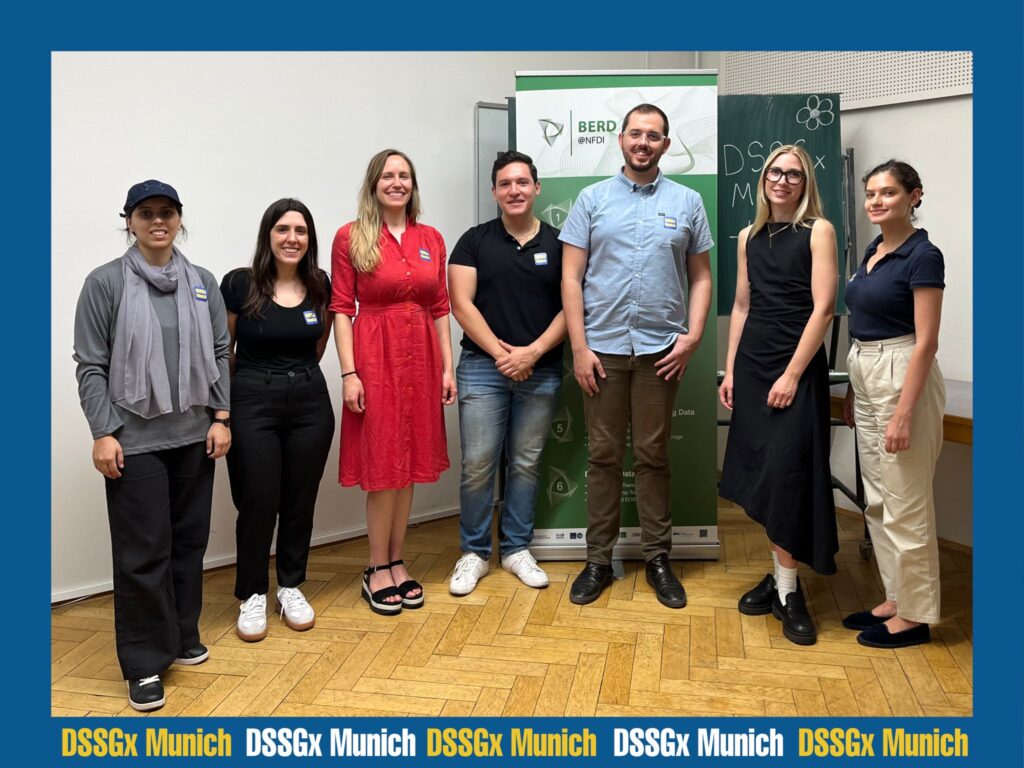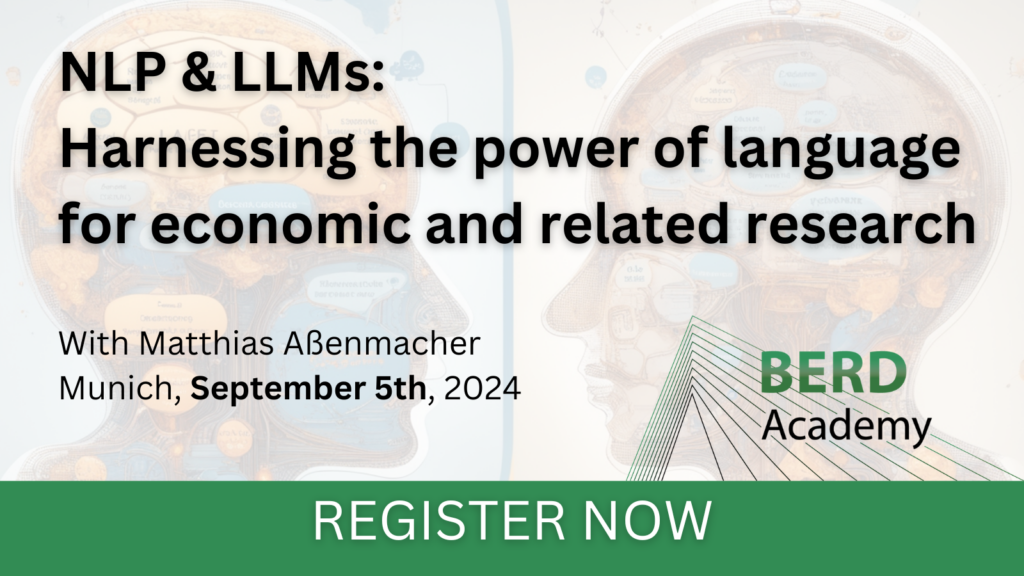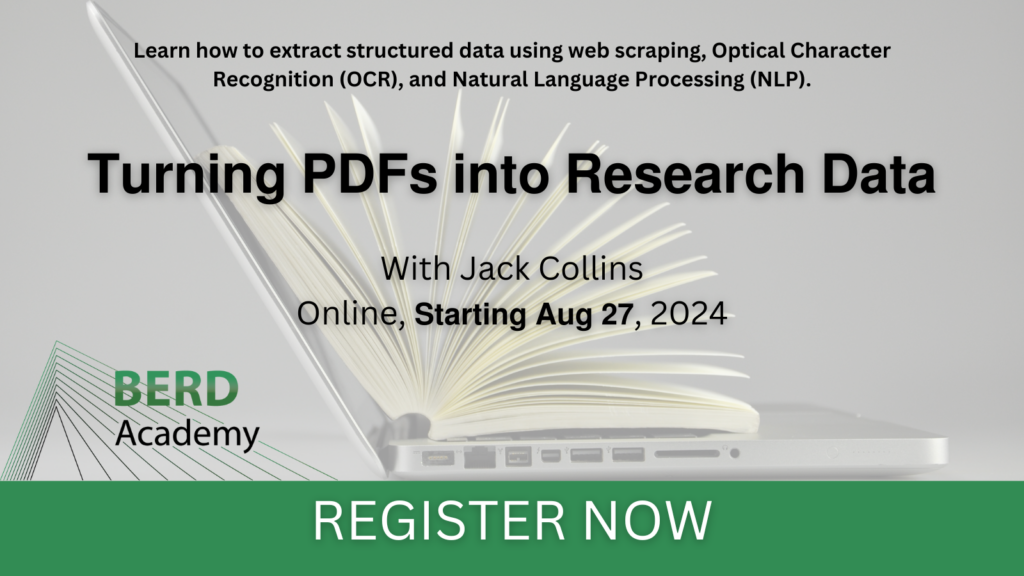These guidelines are designed to enhance DFG project proposals in the fields of business and economics by offering specialized recommendations for reporting research data usage. They serve as a supplement to the general DFG guidelines, addressing the specific needs of researchers in these disciplines. The document emphasizes the importance of ensuring data reproducibility and adhering to the FAIR principles (Findable, Accessible, Interoperable, Reusable) to promote the reuse and sharing of research data. Additionally, it provides detailed advice on data description, documentation, storage, legal obligations, data exchange, and the responsibilities involved in managing research data.
All posts by Veronica Haas
DSSGx Munich 2024 Closing Ceremony
DSSGx Munich 2024 Closing Ceremony – You’re invited!
📅 Wednesday, September 25th, 2024
⏲️ 4:00 – 8:00 pm
📍 Bavarian Academy of Sciences and Humanities, Munich (Alfons-Goppel-Straße 11, 80539 Munich)
After two months of hard work, the international fellows will present the results of their projects.Therefore, we are happy to invite you to the DSSGx Munich Closing Ceremony 2024.
You can look forward to:
- Project Presentations: Learn about the results of our two projects with the Bavarian Forest National Park and the UN’s International Organization for Migration (Global Data Institute).
- Personal Address: Listen to a personal address by Dr. Fabian Mehring, Bavaria’s State Minister for Digital Affairs.
- Special Keynote: Be inspired by Uli Köppen, Chief AI Officer at Bayerischer Rundfunk, who will give her keynote “Great to Have, Hard to Get: Data for the Social Good. How to Become a Data-Driven Society.”
- Networking Opportunity
- Free Food & Drinks!
Please register here by Thursday, Sep 19th (Free Admission).
Job Opportunity: 𝗦𝗲𝗿𝘃𝗶𝗰𝗲 𝗦𝘁𝗲𝘄𝗮𝗿𝗱 𝗳𝗼𝗿 𝗗𝗮𝘁𝗮 𝗣𝗿𝗼𝘁𝗲𝗰𝘁𝗶𝗼𝗻 𝗮𝗻𝗱 𝗔𝗻𝗼𝗻𝘆𝗺𝗶𝘀𝗮𝘁𝗶𝗼𝗻 (𝗺/𝗳/𝗱) at the Mannheim University Library

The Mannheim University Library offers a full-time position as Service Steward for Data Protection and Anonymisation (m/f/d).
As Service Steward you will be the central point of contact for data protection and anonymisation issues related to the Basic Services of the Base4NFDI project and share your expertise within the legal working groups of the NFDI.
Basic information:
- Start: At the earliest possible date
- Term: until 30.09.2026
- Salary grade: E 13 TV-L BW
- Weekly hours: 39,5 Stunden hours (opportunities for part-time employment are available on principle)
- Place of work: Mannheim, city center, Schloss
- Closing date for applications: 06.09.2024
The working languages in the project are German and English.
For more details, please refer to the job posting: https://www.uni-mannheim.de/media/Universitaet/Dokumente/Ausschreibungen_Stellenanzeigen/UB_24_11_BASE_NFDI_3_eng.pdf
DSSGx Munich 2024 has officially started

DSSGx Munich is a 2-month fellowship program that brings together talented data scientists from around the globe to collaborate on social initiatives in Munich during the summer.
The program’s mission is to create, support, and sustain initiatives, solutions, and communities that leverage data science and AI for social good. Since 2023, the Department of Statistics at LMU Munich and the Munich Center for Machine Learning (MCML) have proudly hosted the Munich branch of the DSSG fellowship program.
Last week, 10 fellows from diverse backgrounds arrived in Munich to embark on their journey with DSSGx Munich 2024. Over the next two months, they will contribute to two significant Data Science projects aimed at promoting social good.
Click here to discover more about their projects.
Upcoming Workshop: 𝗡𝗟𝗣 & 𝗟𝗟𝗠𝘀: 𝗛𝗮𝗿𝗻𝗲𝘀𝘀𝗶𝗻𝗴 𝘁𝗵𝗲 𝗽𝗼𝘄𝗲𝗿 𝗼𝗳 𝗹𝗮𝗻𝗴𝘂𝗮𝗴𝗲 𝗳𝗼𝗿 𝗲𝗰𝗼𝗻𝗼𝗺𝗶𝗰 𝗮𝗻𝗱 𝗿𝗲𝗹𝗮𝘁𝗲𝗱 𝗿𝗲𝘀𝗲𝗮𝗿𝗰𝗵

𝗗𝗼 𝘆𝗼𝘂 𝘄𝗮𝗻𝘁 𝘁𝗼 𝗹𝗲𝗮𝗿𝗻 𝗵𝗼𝘄 𝘁𝗼 𝗺𝗮𝗸𝗲 𝘂𝘀𝗲 𝗼𝗳 𝘁𝗲𝘅𝘁 𝗱𝗮𝘁𝗮 𝗳𝗼𝗿 𝘆𝗼𝘂𝗿 𝗿𝗲𝘀𝗲𝗮𝗿𝗰𝗵?
👉 This 𝗶𝗻-𝗽𝗲𝗿𝘀𝗼𝗻 𝘄𝗼𝗿𝗸𝘀𝗵𝗼𝗽 is ideal for researchers who want to explore the potential of Natural Language Processing (NLP) and Large Language Models (LLMs) for economic and related research.
You will receive a broad overview of the theoretical foundations of NLP and its practical concepts. The workshop concludes with a 𝗖𝗼𝗱𝗶𝗻𝗴 𝗟𝗮𝗯 𝘁𝗼 𝗮𝗽𝗽𝗹𝘆 𝘁𝗵𝗶𝘀 𝗸𝗻𝗼𝘄𝗹𝗲𝗱𝗴𝗲 𝘁𝗼 𝗿𝗲𝗮𝗹-𝘄𝗼𝗿𝗹𝗱 𝗽𝗿𝗼𝗯𝗹𝗲𝗺𝘀.
Click here for more information and registration.
Turning PDFs into Research Data | Online course starting Aug 27
Do you ever feel that the data you need for your research is accessible, but not in a convenient table format, such as in company reports or building plans? Is the information you need spread across many different documents?
If only we could read and extract structured data from thousands of written documents…. –

Join our upcoming online course, where we will explore how to accomplish this task by combining web scraping, Optical Character Recognition (OCR), and Natural Language Processing (NLP). Over four weeks, the BERD Academy provides online lessons and interactive sessions to learn the fundamentals of these key technologies.
Click here for more information and to reserve your spot.
BERDies at BiblioCon 2024
Also at this year’s BiblioCon from June 4th to June 7th, 2024, at the Congress Center Hamburg (CCH), our experts will be participating to share their expertise on the latest developments in library science and research data management.
Donnerstag, 6. Juni 2024
Öffentliche Arbeitssitzung
11:00 – 12:30 Saal G.1 (Streaming: The streams are available to all registered participants via the conference app)
Marion von Francken-Welz: Von Fernleihe bis KI: Neues aus dem Bibliotheksrecht
Vasilka Stoilova: Aktuelle Entwicklungen im Datenrecht
Hands-on Lab
11:00 – 12:30 Saal 8
Volltexterschließung leicht gemacht: Ein Crashkurs zur Transkriptionsplattform eScriptorium
Sitzungsleiterin: Larissa Will
Referenten: Jan Kamlah und Thomas Schmidt
Freitag, 7. Juni 2024
Hands-on Lab
09:00 – 11:00 Saal 7
Forschungsdatenmanagement in wissenschaftlichen Bibliotheken: Erfahrungen aus der Praxis
Sitzungsleiter: Jorge Murcia Serra
TK 4: Forschungsnahe Dienste und Open Science
09:00 – 11:30 Saal 9
Referent: Renat Shigapov
See the whole program here.
KGI4NFDI Knowledge Graph Infrastructure
We are excited to share the latest developments in the Basic Service project, KGI4NFDI, a reusable Knowledge Graph Infrastructure designed to enhance research interoperability and support NFDI’s goals. This service includes a KG registry and tools for accessing KGs across NFDI projects, enabling decentralized KG creation with standardized methods. KGI4NFDI also offers surveys, documentation, consulting, and ontology harmonization, promoting FAIR data principles and aligning with the European Open Science Cloud (EOSC). We proudly highlight Dr. Renat Shigapov from BERD@NFDI as one of the Principal Investigators of the initiative.
Vasilka Stoilova elected as new spokesperson of ELSA
We are delighted to announce that Vasilka Stoilova from BERD@NFDI (University of Mannheim) has been appointed as the new spokesperson of the Ethical, Legal, and Social Aspects section (ELSA).
Additionally, Ulrich Sax from the University of Göttingen has been re-elected as deputy speaker.
Congratulations and best wishes to Ms. Stoilova and Prof. Dr. Ulrich Sax as they take on their new roles and responsibilities.
EXTENDED Call for Applications: BERD@NFDI Young Scientist Colloquium 2024
BERD@NFDI Young Scientist Colloquium 2024
June 10-11, 2024
Mannheim, Germany
Extended Submission Deadline: May 20th, 2024
Call for Applications
BERD@NFDI is organizing the 1st Colloquium on empirical research using unstructured data that addresses the special needs of doctoral students and postdocs.
BERD@NFDI is a research data infrastructure dedicated to transforming how Business, Economics, and Related Data are managed. With a special focus on the use of unstructured data in these disciplines, such as images, videos, audio, and text, the goal of BERD@NFDI is to provide a comprehensive suite of services and tools. These will facilitate the searching, collecting, indexing, processing, analyzing, and preserving both data and algorithms, simplifying your data management needs throughout the entire research process. While building such a platform, it is crucial to continuously monitor the state of play in the respective fields, to foster critical discussion and community engagement, and to guide researchers toward employing state-of-the-art methodologies.
Pursuing these goals, the colloquium will be held at Mannheim Business School, Germany, on June 10-11, 2024.
The colloquium provides a unique opportunity for doctoral students, postdocs, and other empirical researchers across business disciplines and beyond to discuss their (dissertation) research with other research fellows and leading academics. We explicitly invite researchers from all disciplines of business, economics, and social sciences (e.g., marketing, information systems, operations research, finance, accounting, management, economics, economic and business history, politics, sociology, psychology) to apply for the conference. The research submitted to this event must involve the analysis of unstructured data.
Submissions should be in the form of a presentation of no more than 8 PowerPoint slides (plus cover slide, text on all slides in Times Roman, and at least 12 font size) that address the following points:
– the description of the research question(s),
– the description of data,
– the analyses conducted or planned,
– the attempted contributions of the research.
Please send your PowerPoint presentation as one PDF file to Lars Gemmer (gemmer@wiso.uni-koeln.de) and use the subject line “BERD@NFDI Young Scientist Colloquium 2024”. All accepted submissions will be presented at the conference.
On the first day of the event, the participants will be introduced to the scope, functionality, and offerings of the BERD@NFDI platform. In addition, faculty, who are renowned experts in working with unstructured data and ML applications, will present recent best-practice approaches to data handling, pre-processing of unstructured data, and further analyzing that data.
On the second day, the event will mostly proceed in three parallel tracks based on the methodological angle of the participants’ work. Doctoral students and postdocs will discuss their work with their fellow students and experienced faculty, gathering detailed feedback on their empirical strategy and questions involving the use of unstructured data. The focus is explicitly on the methodology applied to the research questions. Other aspects of the research such as the attempted contribution, conceptualization, etc. are relevant to understanding the context and may be touched on, but are not the focus of this workshop. Doctoral students and postdocs in all stages of their academic careers are invited to apply for participation in the colloquium.
There is no conference fee. In addition, we are happy to inform you that we were able to secure extra funding that allows us to support young researchers with respect to their travel expenses. Conditional on your submission to the Young Researchers Colloquium, we will reimburse travel expenses up to the amount of EUR 500 for the first 15 submissions (expenses for transportation + hotel). Proof of travel expenses must be provided. We will inform you about the travel support once we receive your submission. You can find our detailed travel expense reimbursement conditions online.
For more information about the colloquium, please visit our website.
We look forward to your submission.
Best regards,
Prof. Florian Stahl (Conference Co-Chair, Mannheim University)
Prof. Hartmut Höhle (Conference Co-Chair, Mannheim University)
Scientific Committee
Dr. Matthias Assenmacher (LMU Munich)
Dr. Lars Gemmer (University of Cologne)
Prof. Marc Fischer (University of Cologne)
Prof. Sibylle Lehmann-Hasemeyer (University of Hohenheim)
Prof. Goeran Kauermann (LMU Munich)

